
PENGARUH KECEMASAN SAAT PANDEMI COVID 19 TERHADAP KETERATURAN PEMERIKSAAN MASA NIFAS
Abstract
The covid-19 pandemic is still not over despite various efforts that have been made. Fear of contracting this virus caused some people to experience anxiety. These restrictions on movement space and health protocols narrow the space for postpartum mothers to check themselves in health services. The purpose of the study was to analyze the effect of anxiety during the covid 19 pandemic on the regularity of the postpartum examination. Non-experimental research design: cross sectional analytic, the independent variable is anxiety, the dependent variable is the regularity of the postpartum examination. The population and sample of postpartum mothers were 45 respondents, the sampling technique was incidental sampling in Wonokromo Village. The data were analyzed using Spearman's test. The results showed that of the 22 respondents with mild anxiety levels, almost all (90.9%) had regular postnatal check-ups. The value of p = 0.021 < 0.05 means that there is a significant effect. It can be concluded that the less anxious mothers are during the covid-19 pandemic, the more it will affect the regularity of postpartum mothers in checking themselves in health services. Postpartum mothers are expected to be able to control anxiety and continue to check themselves by complying with health protocols.
Keywords
Full Text:
PDFReferences
Elliott, A., Elliott, P., & Cook, R. (2020). Postpartum maternal distress: a multidimensional illness requiring a multilevel, multidiscipline response. Australian journal of primary health, 26(3), 222-226.
Kesga. (2020). Pedoman bagi ibu hamil, bersalin, nifas, dan bayi baru lahir di era pandemi covid 19. Jakarta: Direktorat Kesehatan Keluarga Dirjen Kesmas Kementerian Kesehatan RI.
Komariah, N. (2017). Hubungan antara usia ibu dengan tingkat kecemasan ibu postpartum di bpm teti herawati palembang. JPP (Jurnal Kesehatan Palembang), 12(2), 103-107.
Lestari, E. (2017). Hubungan antara paritas dengan tingkat kecemasan yang dialami ibu pada masa post partum di RS PKU Muhammadiyah Yogyakarta. Yogyakarta: Universitas Aisyiyah.
Nanjundaswamy, M. H. et al. (2020) ‘COVID-19-related anxiety and concerns expressed by pregnant and postpartum women—a survey among obstetricians’, Archives of women’s mental health. Springer, pp. 1–4
Rahmaningtyas, I., Winarni, S., Mawarni, A., & Dharminto. (2019). Hubungan beberapa faktor dengan kecemasan ibu nifas di wilayah Kota Semarang. JURNAL KESEHATAN MASYARAKAT, 7(4), 303-309.
Taslim, R. W. R., Kundre, R. and Masi, G. (2016). Hubungan pola makan dan stres dengan kejadian hipertensi grade 1 dan 2 pada ibu hamil di wilayah kerja Puskesmas Kamonji Kecamatan Palu Barat. JURNAL KEPERAWATAN 4(1).
Yuliani, D.R. & Aini, F.N. (2020).Kecemasan Ibu Hamil dan Ibu Nifas pada Masa Pandemi Covid-19 Di Kecamatan Baturrraden. Jurnal Sains Kebidanan 2(2).
Yunita, L., Mahpolah, & Wulandari, D. R. (2013). Hubungan umur dengan tingkat kecemasan ibu primipara pada masa nifas di wilayah kerja puskesmas kertak hanyar. Dinamika Kesehatan, 4(2), 84-92.
Zanardo, V., Manghina, V., Giliberti, L., Vettore, M., Severino, L., & Straface, G. (2020). Psychological impact of COVID-19 quarantine measures in northeastern Italy on mothers in the immediate postpartum period. Int J Gynaecol Obstet, 150(2), 184-188.
Refbacks
- There are currently no refbacks.

